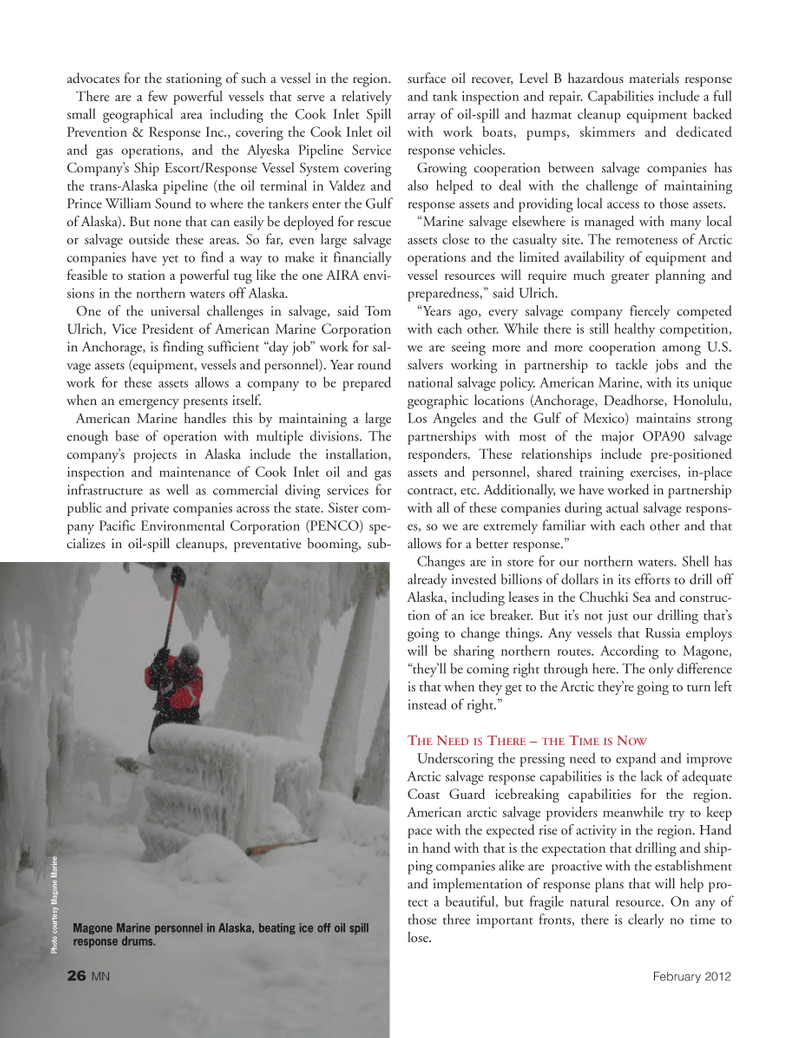
Page 26: of Marine News Magazine (February 2012)
Inland Bulk Transportation
Read this page in Pdf, Flash or Html5 edition of February 2012 Marine News Magazine
advocates for the stationing of such a vessel in the region. There are a few powerful vessels that serve a relatively small geographical area including the Cook Inlet Spill Prevention & Response Inc., covering the Cook Inlet oil and gas operations, and the Alyeska Pipeline Service Company?s Ship Escort/Response Vessel System covering the trans-Alaska pipeline (the oil terminal in Valdez and Prince William Sound to where the tankers enter the Gulf of Alaska). But none that can easily be deployed for rescue or salvage outside these areas. So far, even large salvage companies have yet to find a way to make it financially feasible to station a powerful tug like the one AIRA envi- sions in the northern waters off Alaska. One of the universal challenges in salvage, said Tom Ulrich, Vice President of American Marine Corporation in Anchorage, is finding sufficient ?day job? work for sal- vage assets (equipment, vessels and personnel). Year round work for these assets allows a company to be prepared when an emergency presents itself. American Marine handles this by maintaining a large enough base of operation with multiple divisions. The company?s projects in Alaska include the installation, inspection and maintenance of Cook Inlet oil and gas infrastructure as well as commercial diving services for public and private companies across the state. Sister com- pany Pacific Environmental Corporation (PENCO) spe- cializes in oil-spill cleanups, preventative booming, sub- surface oil recover, Level B hazardous materials response and tank inspection and repair. Capabilities include a full array of oil-spill and hazmat cleanup equipment backedwith work boats, pumps, skimmers and dedicated response vehicles. Growing cooperation between salvage companies has also helped to deal with the challenge of maintainingresponse assets and providing local access to those assets. ?Marine salvage elsewhere is managed with many local assets close to the casualty site. The remoteness of Arctic operations and the limited availability of equipment and vessel resources will require much greater planning and preparedness,? said Ulrich. ?Years ago, every salvage company fiercely competed with each other. While there is still healthy competition, we are seeing more and more cooperation among U.S. salvers working in partnership to tackle jobs and the national salvage policy. American Marine, with its unique geographic locations (Anchorage, Deadhorse, Honolulu, Los Angeles and the Gulf of Mexico) maintains strong partnerships with most of the major OPA90 salvage responders. These relationships include pre-positioned assets and personnel, shared training exercises, in-place contract, etc. Additionally, we have worked in partnership with all of these companies during actual salvage respons- es, so we are extremely familiar with each other and that allows for a better response.? Changes are in store for our northern waters. Shell has already invested billions of dollars in its efforts to drill off Alaska, including leases in the Chuchki Sea and construc- tion of an ice breaker. But it?s not just our drilling that?s going to change things. Any vessels that Russia employs will be sharing northern routes. According to Magone, ?they?ll be coming right through here. The only difference is that when they get to the Arctic they?re going to turn left instead of right.?THENEEDIS THERE? THETIMEIS NOWUnderscoring the pressing need to expand and improve Arctic salvage response capabilities is the lack of adequate Coast Guard icebreaking capabilities for the region. American arctic salvage providers meanwhile try to keep pace with the expected rise of activity in the region. Hand in hand with that is the expectation that drilling and ship-ping companies alike are proactive with the establishment and implementation of response plans that will help pro- tect a beautiful, but fragile natural resource. On any of those three important fronts, there is clearly no time to lose.26MNFebruary 2012 Magone Marine personnel in Alaska, beating ice off oil spill response drums. Photo courtesy Magone Marine MN#2 (18-31):MN 2011 Layouts 2/3/2012 1:45 PM Page 26

 25
25

 27
27
